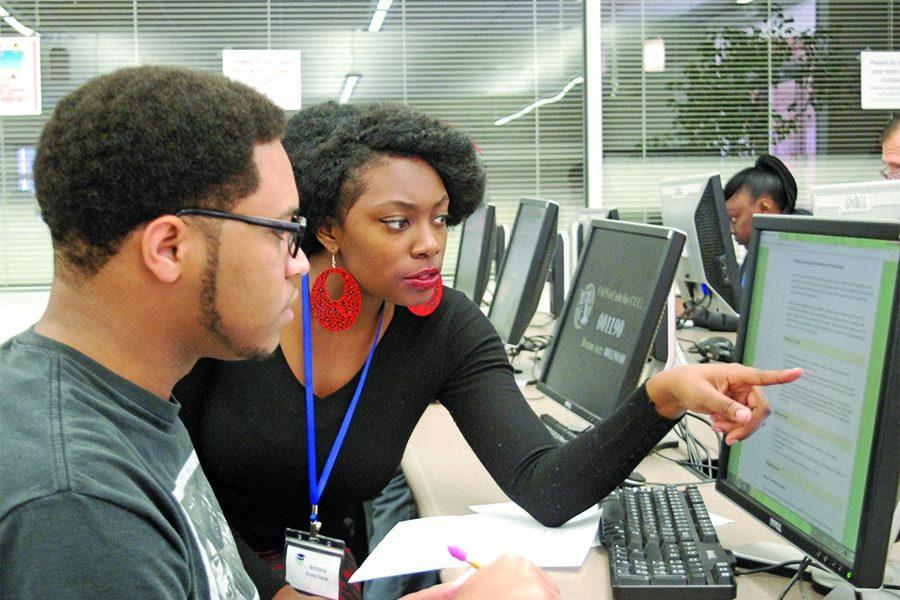Program increases retention
Peer-led tutoring boosts retention rates, gives help
Mar 8, 2017
Students can receive group tutoring from fellow classmates by attending the College Skills Center’s peer-led team learning program.
The PLTL program at Contra Costa College gives students the opportunity to learn from their peers by attending hour-long group study sessions.
Special tutors embedded within the classes lead these sessions.
Tutors in the program are student workers who are scheduled to teach one specific subject each day they work.
Tutoring Office assistant Jordan Miller said, “There has been a 30 percent increase in the retention and successes rates of those who have been receiving tutoring compared to those who do not.”
According to data provided by the Campuswide Summary Overview Report of students in English 142A who participated in the PLTL during the 2016 spring semester had a 96 percent retention rate and a 79 percent success rate.
However, students who did not receive tutoring had a 76 percent retention rate and a 41 percent success rate.
The same data also shows that students who participated in tutoring for Basic Skills Math (Math 101 through Math 118) had a 95 percent retention rate and a 59 percent success rate, according to the report.
However, the success rate for students who did not access PLTL was 44 percent.
Students who took Math 120 PLTL tutoring had a 95 percent retention rate and an 80 percent success rate. Meanwhile students who took Math 125 PLTL tutoring had a 100 percent retention and success.
The PLTL program offers students help in a variety of classes. These classes range from math, science, Spanish, English and several others. Students can check in with their professors to know if their class has a PLTL program.
Campuswide Tutoring Coordinator Brandy Gibson said the program started nearly three years ago.
Gibson said it is modeled after San Jose City College’s program that targets classes with high numbers of struggling students.
Criminal justice major Ben Hayunga said, “I would be miles behind if I had not been coming to tutoring. I feel like a kindergärtner learning Spanish and our tutor is really good at explaining things that get rushed over in class.”
PLTL tutors must attend a monthly meeting and also take the Academic Skills 200 or 201 classes to receive a certificate that allows them to tutor that specific subject.
Miller said tutors have two monthly meetings that serve as training sessions.
One session is smaller.
Students who want to apply to be a tutor must turn in an application with their unofficial transcript and references from their teachers. PLTL tutors earn an average of $10.50 per hour and are allowed to work up to 20 hours a week.
Miller said, “Anyone can apply to be a tutor as long as they passed the class they wish tutor with an A or B. Depending on the references we receive we invite potential candidates in for an interview.”
Political science major Cinthya Zuniga said, “The current group I taught just received their first test back. The lowest score among them was 80 percent.”
Zuniga is one of the 96 tutors currently working at the College Skills Center.
Nursing major Christine Empig said, “I think it is easier to learn from a tutor than a teacher. The teachers have to focus on a lot of students and the tutors are able to take more time since it is just a couple of us.”
Zuniga said she makes lesson plans based on what students are currently learning in the book and tries to help them build confidence in their own work.
Retired social worker Doris Moore said this program is personal and less tense than learning from teachers. Unlike regular class sessions, she looks forward to coming here every time.
Applied mathematics major Aldo Hernandez said, “It is a lot more personal. We get to really sit down and get close to the students.
“By having us attend the classes, students see us as classmates instead of tutors.”
Zuniga said, “I have taught up to 12 students at once. I help them with everything from their presentations, study guides and homework.”
Miller said they try to leave the homework help for the drop-in tutors, but if a large number of students are stuck on the same things the PLTL tutors might take over.
Moore said, “This program is very advantageous to students. My grades and my understanding are better. If it had not been for this program, I would have been struggling with my classes.”
Hernandez said the program is definitely beneficial to those who participate.
He said drop-in tutoring is incredibly rushed but PLTL tutoring can go on for hours.
The PLTL program also offers students help by offering them a free book for their class.
Miller said in order to get a free book students must sign the Campus-Wide Tutoring Book Loan contract that says they will attend 10 PLTL classes.
“The free book program is an incentive for people to show up to the PLTL program. We had pretty good numbers, but we wanted to create an incentive to increase them,” Miller said.
Hayunga said the free book program was originally what brought to him to the PLTL program, but because “the tutors are more giving with their time in the PLTL study sessions,” he stayed.
Hernandez said, “As a tutor I feel a lot more like their friend who has all the answers than just a regular tutor.”
Miller said they reach out to as many teachers as possible to try and get tutors embedded into their classes.
By doing this, PLTL tutors can focus their study sessions on what students learned that particular day in class and target any issues students may have.
Zuniga said she is sad to be graduating soon because she loves being part of the PLTL program. She said she loves meeting new people and providing them with the help they need.
Hernandez said, “Every time a student comes in here it is like they are reaching their hand out for help, and I am happy to hold their hand and show them they are not alone.”



